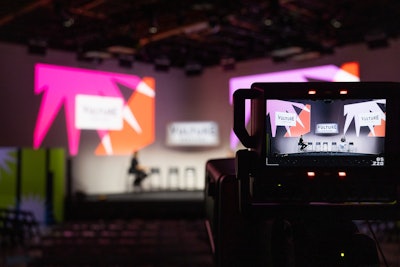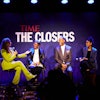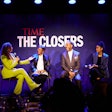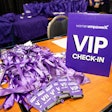
In mid-November, Los Angeles-based AV tech company ShowPro braced for what the team affectionately called a “Heaven Week”—a whirlwind schedule of events so packed that it generated a whopping seven figures of business. From high-profile gatherings like the ADCOLOR conference, Vulture Festival, and GQ’s Person of the Year celebration to a car brand activation, an executive retreat, a movie premiere, and more, the diversity and scale of the projects required meticulous planning and flawless execution.
“It became a running joke around the office that anytime the phone would ring, the automatic response was, ‘Guess which week this job falls on?’” recalled David Smith, ShowPro’s president and CEO, who says weeks like this tend to happen a couple of times a year. “We didn’t see this concentration of work as a deterrent, but an opportunity to find a more efficient process in which to execute the work.”
So how did they pull it off? We caught up with David and his wife, ShowPro co-president Cheryl Smith, to learn the strategies that kept the wheels turning—and the lights shining—through one of the busiest weeks of the year.
1. Embrace efficiency with the right tech tools.
Efficiency was key for managing such a demanding schedule. While David values tried-and-true methods like Excel, he also emphasizes the importance of technology in improving operations. “This year, we took measures to become more efficient, investing in new software platforms for project management, crew scheduling, inventory management, accounting, and client relationships,” he explained.By combining “old-school” processes with modern technology, the team created a system that allowed them to stay organized and adaptable, even with multiple projects running simultaneously.  ShowPro provides lighting, audio, video staging, and projection to the corporate meeting and special event industries.Photo: Daria Taylor
ShowPro provides lighting, audio, video staging, and projection to the corporate meeting and special event industries.Photo: Daria Taylor
2. Assign dedicated teams for each event.
One of ShowPro’s key strategies was assigning dedicated account representatives and technical directors (TDs) to each event. “In an ideal setting, we’d have the full extent of our resources to throw at one job—that said, our priority of service obsession to our clients requires us to not lose that edge during runs where we are stretched thin,” David said. “We have the luxury of having a deep roster of full-time talent on our staff that are not only experts in their specialty but have extensive client relations and crew leadership experience.”This allowed the company to assign a dedicated project manager to each client, and also ensured the team’s specialists were fully focused on their project manager's vision. “These are small nuances that can have big impacts on the outcome of a show,” he noted. “A dedicated TD and/or project manager will be able to adapt to ever-evolving client needs that happen during preproduction, production, and post-op.”
3. Leverage shared resources in a strategic way.
While keeping teams separate for each event, ShowPro did rely on some overlapping resources, particularly in the warehouse and operations departments. One key player was their full-time operations manager, a fairly recent hire who oversees systems from design to truck logistics—without directly participating as a crew member.For the most part, “We try to share software and systems between events, and not people,” explained Cheryl. “This is possible because of the work of our admin and warehouse teams here at the shop working with software that can keep track of data a lot better and faster than people can.” The warehouse team’s efforts were monumental during the week, Cheryl added. Consider these stats:
- 12,000 items scanned in and out
- 53 truck deliveries, returns, and transfers
- 9 trucks used
- 50 estimates, invoices, and bid revisions distributed
- 100 hours of overtime worked
“The software they use to track progress allows for an organized distribution of information so the project managers on site can trust they have exactly the equipment they need, and that the changes our clients may request on site will be accounted for, without having to worry about the execution of any other project,” she said.  The ADCOLOR Conference, which focuses on the importance of diversity in advertising, was held Nov. 14-16 at JW Marriott Los Angeles L.A. LIVE.Photo: Daria Taylor
The ADCOLOR Conference, which focuses on the importance of diversity in advertising, was held Nov. 14-16 at JW Marriott Los Angeles L.A. LIVE.Photo: Daria Taylor
4. Foster strong client relationships.
Cheryl also emphasized the importance of maintaining clear, quick communication with clients. “Whether working with a brand-new client or one of our decades-long partners, setting this tone early from top to bottom of our organization allows for mutual respect and trust with our clients, and confidence in the success of our projects,” she noted.ShowPro maintains an open-door policy in its office, with full-time staff working in person whenever they’re not on-site—ensuring they are always reachable for clients. “This work in advance allows us to be well prepared as we send our highly qualified and vetted crews and industry-leading gear to site with the knowledge to problem-solve to make shows run smoothly,” she said.
5. Build a roster of reliable workers who are invested in the company.
ShowPro has 30 full-time employees who come into the shop daily—but also retains an extensive roster of 250 part-time staffers who are all W-2 employees, rather than traditional freelancers. “We don’t play the 1099 game unless we are dealing with true independent contractors,” explained Cheryl, adding that each of these employees has the opportunity to participate in ShowPro’s 401(k) program, including a company match.The goal, she said, is always to offer enough benefits that even the part-time workers feel valued and like advocates for the company. “This has paid off in a big way—we have incredibly loyal freelancers that often check in with us before they take another job with another company because they prefer to work with us,” she pointed out.
Fun fact: During the recent “Heaven Week,” ShowPro’s network of employees covered 10 events across three cities and two states, taking on 478 shifts for a total of 5,000 working hours.  "This particular 'Peak Week' revealed itself pretty early because a couple of the larger jobs are recurring events," noted David. "For example, we knew ADCOLOR and Vulture Fest would overlap entirely dating back to postproduction recaps of those same jobs in 2023."Photo: Daria Taylor
"This particular 'Peak Week' revealed itself pretty early because a couple of the larger jobs are recurring events," noted David. "For example, we knew ADCOLOR and Vulture Fest would overlap entirely dating back to postproduction recaps of those same jobs in 2023."Photo: Daria Taylor
6. Do extensive preplanning based on prior experiences.
For weeks like this, ShowPro relies heavily on preproduction, drawings, and schedules. “Post-show reports have become the gold standard,” said Cheryl, emphasizing that the team reports every single thing that worked or didn’t work on a job so they can identify patterns for the next project.“For example, if we get stopped at a weigh station with an overloaded truck and we’re forced to send up a second truck to off-load onto, it makes us late for a load-in, which can quickly derail a production plan,” she said. The solution? “Standard practice at the shop pivots to weighing all truck loads, and informs us on the necessity to sub out semis for big shows that needed to have heavy loads. This practice over hundreds of events every year for decades allows us to discover what works and what needs work.”
7. Always have a backup plan.
Despite meticulous preparation, logistical issues are inevitable. “As hard as we try to be prepared, unexpected circumstances still arise,” David said. While some complications are easy to solve, others are mission-critical, like a generator failure.“If the generator fails, the show fails—so we often insist on backup show-dependent equipment such generators, video projectors, and consoles," he explained. "Removing the potential for failure from circumstances beyond our control and putting the show’s success in the hands of our personnel allows our full confidence in the show’s ability to succeed.” The team also always has on-call standby drivers and crew in case an issue arises, and a mobile truck repair service that works 24/7 in case of a truck failure.  ShowPro also worked on Gwyneth Paltrow's In Goop Health Summit, held at LA's Milk Studios on Nov. 16.Photo: Courtesy of ShowPro
ShowPro also worked on Gwyneth Paltrow's In Goop Health Summit, held at LA's Milk Studios on Nov. 16.Photo: Courtesy of ShowPro
8. Prioritize employee well-being.
To prevent burnout, ShowPro encourages staff to take time off before and after busy stretches. “There are loads of times during the year where the [work-life] balance is not great, and our crew understands they need to be physically and mentally prepared for a busy stretch like this,” Cheryl said. “To maintain that balance, we empower our full-time staff to take days off before and after to recover.” (This time, for example, giving them the option to take off the entire week of Thanksgiving.)In addition, ShowPro has expanded its full-time staff by seven people in the past year to alleviate workloads during busy periods. “The growth of our community has not only provided stress relief for the existing staff, but also emboldened our culture with the commitment and character they’ve brought to the table,” she said.
9. Invest in your business.
So, what advice do the Smiths offer to other companies facing similar scheduling challenges? “Don’t be cheap!” advised Cheryl. This means investing in high-quality equipment, software, and backup plans—but most importantly, in people.“Hire smart people. Hire nice people. If you have any interest in building a career and doing this for 30 or 40 years, you better invest in people who will stay with you and support your vision,” she said. “The insanity of the events world needs the tech people to be calm and capable. At the end of the day, we are in the hospitality industry, serving the needs of our clients and customers. Spend the money and do it right!”



















